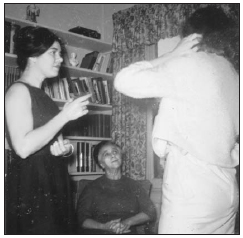At my mother’s house in Martha’s Vineyard, there are three big boxes containing nearly every letter that my father ever received. The collection spans forty years, but the bulk of them date from the 1950s, when my father was living in Greenwich Village.
Sitting on the floor of the living room, I sort the letters into piles: the ones from his mother and Lorraine; the ones from his first wife, Aida, and their daughter; the letters from friends—Ernest, Milton Klonsky, Michael Vincent Miller, Vincent Livelli, and a junkie named Stanley Gould who writes from prison to thank my father for sending him some cash and a change of clothes for his release. There are notes from fans about stories and essays he’d written, professional correspondence from editors at literary magazines and New York publishing houses, and letters from girls. Before long, the ones from girls overtake every other type.
There are hundreds of them: dozens from a single woman and solitary notes from girls who never appear again. Most of the letters appear to be written in the midst of a romantic interlude between my dad and the author. Sometimes the girl has gone back to college or she is away for the summer. Or else she simply wishes to communicate things that are too delicate or risqué to say out loud. It’s clear from their letters that my father wrote these women back. I ran a query in the pages of the New York Times Book Review, asking to hear from people who knew my dad, and while I was contacted by some old girlfriends who remembered him vividly, none held on to his correspondence. I imagine that his letters were the sort that a woman burned, reluctantly, in some private ritual, before heading off to say “I do.”
More than one of my father’s friends suggests to me that perhaps Anatole couldn’t finish his novel because he spent all his creative energies on seducing women. His analyst from the mid-1950s remembers that my father would often start a session by mentioning that he’d “made a new discovery,” meaning that he’d met a new girl. He picked them up on the street and in Washington Square Park, in bookstores and museums, and in the San Remo and Cedar Tavern, where men were said to follow him in hopes of getting lucky with a disappointed girl after my father had made his selection for the night. Writing was another kind of seduction—you had to entice your readers to enter your imagined world—but it took longer and required more work. With writing, my father wasn’t as sure of being successful.
Significantly, my father was attracted mostly to blondes. The analyst was unaware of his ever having a relationship with a girl who wasn’t white. If my father was worried about fitting into his adopted world, each woman who said yes—to an invitation for dinner or a request to make love—offered the warm embrace of social acceptance. Each woman who wanted him was a validation of his self-made man. His relentless womanizing, which persisted for most of his life, was also a way to keep his connection to the Broyard legacy and his grandfather Belhomme alive.
The girls in the letters have sturdy American names like Ann or Susan or Sarah or Barbara. A few sign off with more exotic, boyish-sounding nicknames like Jae, Lou, or Mel. They write in curlicue handwriting on light blue stationery or in hurried-looking cursive on sheet after sheet of plain white paper. Some of them type their letters, carefully, with no cross-outs or corrections. One girl, a particularly young one, misspells “renaissance” three times—ranaissant, ranasance, ranaissance—before she gets it right. (She is writing a paper about renaissance art for her freshman year art history class and has asked my father to recommend some books. I imagine he dismissed this request: he’s twenty years the girl’s senior and has been contributing articles to the country’s most respected journals for over a decade. But to my amazement, the girl’s next letter thanks him for sending the lovely art books.)
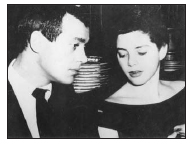
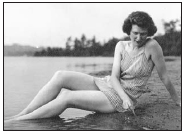
There are letters written in choppy English from girls who live in Denmark or Sweden; a few dozen written in French, and one written in Italian, a language that I didn’t know my father could read. These girls are dancers, models, students, potters, writers, or rich daddy’s girls who complain about the boring office jobs they’ve taken to pass the time. A few of them are married. A few others are deeply troubled. They write from mental institutions, thanking my father for his faithful correspondence; he is, they tell him, their one true friend, the only one who understands them.
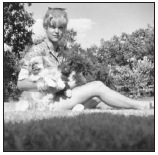
In one of the boxes, I also find an envelope containing all the photographs of themselves that the girls enclose (at my father’s request), along with their little apologies—that their nose is too big, their legs are too fat, or they didn’t have any better pictures lying around.
Occasionally someone writes something about black people. One girl whom he dated on and off for a year or so tells him how she tried to talk to some Negroes after reading a James Baldwin story. “However it was a flop because they were Ethiopian nobility, extremely blasé, feeling not at all oppressed because they were black.” Another girl who is working for a few months in the Virgin Islands describes the black men who “creep all over...most of them act as tho’ they just let go of the limbs of a banana tree...” And then she adds, “One nice thing, most of the Negroes walk like you except for the ones who are pregnant which is about 95%.” My father is apparently undeterred by her observations, because her next letter responds to his urging her to come home for Christmas.

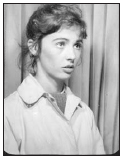
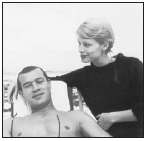
I read through every last one. I like best those letters written during courtship, especially the ones where the women reflect on their most recent rendezvous with my father. How courageous these young women seem! As Joyce Johnson describes in Minor Characters, her memoir about the Beats in the 1950s, “[Sex] was the area of ultimate adventure, where you would dare or not dare.” The girls who write my father seem amazed by their own boldness, especially when recounted from the calm distance of their dorm rooms or childhood bedrooms, for those still living at home. They share their feelings with the guilelessness and vulnerability of children, as if through the experience they have been born anew.
One girl tells my father that she has always felt less feminine than other girls because she is big-boned. She writes: “So it made me so happy when you picked me up in your arms for a moment and lifted me off my feet.” Another girl says how glad she is that my father is a writer, because then she can always keep him near, reading his words or imagining what he would say if they were walking together. Yet another girl writes about the “numinous quality” of their lovemaking and of her gratitude to my dad for introducing her to sensual pleasures that she’d begun to believe didn’t really exist.
From the women’s letters comes some suggestion of my father’s end of the conversation. He writes to them about their clothing styles and their figures—their “quattrocento” beauty or their scrubbed midwestern faces; one girl has “sturdy Israeli knees.” He fits them into categories: whether they are “sleepers” (which I gather means that they are good to actually sleep next to) or have the qualities of wholesomeness that make them “Pure Food and Drug Act” types. Sometimes he corrects them—their use of certain words or their grammar, or scolds them about the books that they are or are not reading. He signs off his letters with “affection,” or occasionally with “love”; there’s the ironic “you know what comes here,” or an old favorite, “pornographic kisses.”
It’s obvious too that my father often cautions them, in between seducing them, that they will never be the only one. Sometimes he offers that he hasn’t graduated yet from “charm school” and therefore isn’t ready to settle down. Other times he’s more frank, saying that he tends to lose desire for a girl when he becomes too friendly with her. Some of the women respond to his warnings with bravado, insisting that they knew all along that this was the score and they like it better that way too. Others confess their worry that they’re going to be hurt, as if this confession will protect them. Few, however, seem to have actually taken my father at his word. For many, he is the first man they have slept with, and they imagine that this offering has earned them the right to expect something in return—to be the one who is the exception to the rule.
And so the second most frequent type of letter is the bitter reexamination of the relationship in the wake of its end. Now the girls let loose their resentment about having their looks, clothing, and taste in literature critiqued. They confess to chafing at my father’s corrections and constant lecturing about books, art, and life. Sometimes they revisit the scene of their seduction, which strikes them in hindsight as calculated and formulaic. One woman accuses him of following the same program with all his conquests:
1. mood talk
2. favorite little bar
3. present Journey to the End of the Night (maybe you have 100s of them)
4. do it with clothes on
5. do it with clothes off
(As far as I can tell, she was right, although it’s hard to imagine Céline’s misanthropic tale of a French doctor during World War I as a successful tool for seduction.) These former girlfriends denounce my father as shallow and callous for his inability to settle on a single woman. They describe feeling tricked, betrayed.
My father appears to have answered these letters too, for some of the women write next to offer their forgiveness, and a few of them turn into true friends. They begin writing with news of their next love affairs, and counseling my father on his own. To some my father confides that he is growing bored with his own routine. In 1960, around the time of his fortieth birthday, he begins to write about wanting to get married, to this one or that one perhaps, but to someone sometime soon.
“As a bachelor, Sundays were lonely,” my father later wrote, “and I began to wish for children around.” Actually he was lonely much of the time—or so he confided to his women friends—despite all his female companionship and his friends down at the San Remo. He began to question, in the guise of the narrator of his novel-in-progress, whether spending one’s day reading and thinking constituted a real life. One of the character’s friends who gets married, has a child, and moves to Kew Gardens tells him: “This is how it goes: your life is there and you live it. You don’t read it in a book or take a walk through it or dream it, and you don’t think it up either—it’s there.” In his notes for the book, my father imagined the story would drive toward a “terrific nostalgia for normalcy.” Perhaps if he himself lived a more ordinary life, he’d be able to let go of his crippling perfectionism and finally finish his novel.
He shared with Ernest his vision of family life. He imagined a house in the country and a wife who played the piano. He’d be writing in his study, with the soft sounds of piano music and children’s laughter floating up the stairs. In 1961 letters from a twenty-three-year-old dancer named Sandy Nelson began to appear. To the shock of almost everyone who knew him, my father could be domesticated after all. But some of his friends, Ernest in particular, weren’t ready to give up their favorite perennial bachelor.
In many ways my mother was a perfect match for my father. She was his type, thin and blond (and played the piano), and while my father described himself as a metaphorical orphan, my mother was a literal one. Both her parents were dead by the time she was twenty years old, and she was estranged—emotionally at least—from her brother, Brook, and sister, Barbara. They didn’t approve of her pursuit of modern dance. When she told them how in class one day Martha Graham had put her hands on her shoulders and told her she was a dancer, Brook had scoffed: She has to say those things. It’s good for business.
It was January 1961. My mother was riding the uptown Lexington Avenue subway to Grand Central after getting out of class at the New School when an attractive man started talking with her. Telling the story of meeting my father now, my mother shrugs and says, “We grabbed the same pole.” It was no accident. My father spotted my mother leaving the New School—her dancer figure caught his eye—and he followed her to the station. Watching her pose on the subway steps, as she stretched out her calves, which were tight from a dance class that morning, he made up his mind to ask her out.
My father introduced himself as a professor at the New School. On hearing his name, my mother remembered running across his offering in the course catalog: something about popular culture that sounded rather lightweight. But he was handsome and charming, and she had some time before catching a train back to Westchester, where she had grown up and was now living. So when my father asked her to join him for a drink, she agreed.
Over martinis at the Vanderbilt Hotel, my mother’s impression of her date improved. She learned that my father played in a regular volleyball game up at Columbia University with a former religion professor of hers. And he was an intimate of Greenwich Village, which was a world apart from the one my mother had grown up around, the one that her siblings still frequented—drinks at the Stork Club, dinners at ‘21,’ husbands who bought their wives mink coats and played golf at the country club. My mother told my father that she’d just returned from a year in Europe and was hoping to move to the Village too.
My father was impressed by my mother’s Nordic beauty and glamorous past, her old-fashioned innocence and sophisticated poise. She had such confidence in her ability to recognize what was fine and beautiful in life—the best churches in Europe, the right cut of steak, the kind of dress that best suited her figure. She’d performed a nightclub act in cabarets in Europe, where she was obliged afterward to faire la salle, or dance with the male customers. At the Jockey Club in Paris, she’d sold more glasses of champagne than any other girl. But she also knew how to knit woolen caps and sew buttons on jackets and refinish furniture. Perhaps with my mother in his life, the ordinary could be extraordinary. After dating for five or six months, he asked her to marry him, and she said yes.
My father was seventeen years older than my mother, but she’d never thought to ask about his age. (He often lied about it anyway.) Nor did she know anything about his family background. Such autobiographical inquiries were considered square in the Village. Anyway, she wasn’t eager to divulge her own past, although it had been haunting her more and more, because at the heart of my mother’s story lay a secret tragedy too.
When she was nineteen, her father was diagnosed with multiple myeloma. At the start of her junior year, my mother transferred from Mount Holyoke College, in Massachusetts, to the Juilliard School of Dance, in New York City, to be closer to her parents, who lived just outside the city. A month after her classes began, her father died in their dining room, in a hospital bed that occupied the place where the dinner table usually stood.
My mother had been a religion major at Mount Holyoke, where she’d met her boyfriend, a Dartmouth graduate who was studying to become a minister. She leaned on him now, their shared interest in faith giving her great comfort. She’d just turned twenty, and she began to hope that this boy would ask her to be his bride.
Over Christmas break my mother was having dinner in the room where her father had recently died when someone knocked on the front door. It was her boyfriend’s fraternity brother. He had come to tell my mother that the young man she loved was dead, killed in a car accident outside of London. As my mother listened to this news, she smiled slightly, a gallows grin, and then she started to weep.
In the months that followed, my mother felt that she and her mother were drifting apart in their separate pools of grief. My mother proposed that they take a trip together to Norway, where some cousins lived. The second day in Oslo, they picked up a rental car—a squat convertible. My mother, who always drove on long car rides, slid behind the wheel for the three-hour trip to their relatives’ house.
The weather was mild and clear, and so they put the top down to better enjoy the view of mountains and fjords. My mother came upon a truck lumbering down the highway. With no cars approaching, she accelerated and moved into the passing lane. But just then the truck driver pulled out to pass an even slower-moving truck in front of him. He didn’t see the little car in his side-view mirror.
For years the thought that if only she had beeped would torture my mother. It would play over and over in her brain, disturbing her sleep and her waking hours too, as if the repetition and intensity of this regret could one day burst a hole in time through which she could reach back, press the palm of her hand against the center of the car’s wheel, and sound that horn at last.
My mother veered off the side of the road, and the car flipped. She and her mother were thrown through the air. After a minute my mother stood up, stunned and shaken but uninjured. Other cars had pulled over, and a man was hurrying toward her. My mother could see her mother lying in the grass twenty feet away, but this man had caught her in his arms and she couldn’t move. In his accented English, he was saying: She is dead. She is dead. My grandmother had had a fatal heart attack in the air. On the edge of the roadway, standing in this stranger’s arms, my mother began to scream.
The police took her to the station, where they nicked her ear for the blood alcohol test that was customary in all traffic accidents. My mother hadn’t been drinking, but this cut made her feel marked with blame. At the airport, waiting for her flight back to New York, she caught people looking at her, knowing that she’d been in an accident.
My mother’s sister and her best friend went to JFK to meet her. They didn’t recognize her at first as she walked down the corridor from the plane. Her blond hair, which she normally wore long around her shoulders, was pulled back into a tight bun. She was carrying a large red shopping bag, and my aunt remembers thinking it odd that my mother had the time or inclination to go shopping. And then Barbara, and my mother’s friend too, noticed the bulky square shape of the bag’s contents and realized that what my mother was carrying—what in fact had rested between her feet for the last seven hours—was the ashes of her mother’s body.
My mother never cried about the loss. Not once that anyone witnessed. And that’s the end of the story, as my mother’s friend and her sister tell it. But at night my mother began to have dreams that made her afraid to go to sleep. Sometimes, during the daytime hours, she would burst into tears or begin to tremble for no apparent reason. Today she would be diagnosed with post-traumatic stress syndrome. A therapist might help her to revisit the scene of her mother’s death so they could understand together that it wasn’t her fault. My mother would have the support of psychotropic drugs and a community of other people who’d also suffered great losses. She’d be encouraged to talk about her feelings.
In the late 1950s, however, that wasn’t how things were done. Back then people suggested having a drink if you were feeling anxious, taking a pill if you couldn’t sleep. So my mother had a drink. She took a pill. And it worked, for a while at least.
It was my father who first gave my mother the sleeping pills; he struggled with insomnia himself. When she began staying overnight at his place on West Tenth Street—there was no one to tell her not to—and he saw how much trouble she was having falling asleep, he offered her some pills from his supply. The summer after they became engaged, my father went off to Europe to “exhaust the last of his romantic restlessness,” and my mother, left alone in his apartment, started taking the pills every night.
During their two months apart, my parents wrote to each other almost daily. In her letters my mother attributes her insomnia and bouts of depression and anxiety to her frustration about the progress of her dance career. She tells my father that she is counting on their marriage to provide the strength and stability that she needs so badly in her life. For my father’s part, he confides: “I rely on you with all my heart to make me happy and productive.” They write to each other of their “infinitely romantic domestic plans.”
In my father’s absence, my mother had been turning his bachelor pad into a home. She found an old wooden rocking chair that she spent her evenings restoring with wax and furniture stain. She made curtains for the windows, bought a GE steam iron to press their clothes, hung a small chalkboard in the kitchen on which to note things to pick up at the store—all of which, recounted in my mother’s letters to him, filled my father with delight.
This trip, he predicts in one letter, will be his last experience of loneliness. When he looks at her picture, he writes, tears well up in his eyes, something that happens to him about once every ten years. “It’s not really because I miss you though, but because you make me so happy and I never expected to be happy that way. I feel more like a bride than a husband, if you can understand that, because I’m so unused to this tenderness.”
My mother rescued my father from his role of being a spectator on the world and enticed him to participate in the everyday dramas of real life, while he became, she writes, “the object of my affections—my salvation, my inspiration—all that and more.”
I’m surprised and touched by the abundance of genuine romantic feeling in my parents’ correspondence. It’s hard to believe that all my father’s years of bachelorhood hadn’t corrupted his store of affection, and all my mother’s tragedies hadn’t scarred over her ability to love. They put so much hope into each other, they had so much riding on the success of this union, that I find myself worrying for them, even as I know how everything turns out.
My father hadn’t returned from Europe before cracks began appearing in their snow-globe vision of the future. For starters, my mother’s siblings disapproved of the match: Sandy was too young and too naive for my father. She would get hurt; he would never make her happy. What did he do for a living anyway? They wondered if he was after my mother’s money. She was living off a small trust from their parents’ estate, but she was due to inherit a much larger sum after their grandmother’s death, which was looking rather imminent.
My uncle Brook went so far as hiring a private detective to investigate my father, which was something that had been done to Brook himself by the father of a girl that he’d been dating. But my father’s report—as my mother never tires of saying—came back spotless, which makes me wonder about the skill of this private eye. He didn’t even turn up the information about my dad’s racial background. That piece of news my mother would learn from his friends.
In her letters to my father, my mother discloses that his pals have been taking good care of her in his absence. One woman in particular—an ex-girlfriend of my dad’s named Sue Freeman—had been particularly friendly, inviting my mother to dinner, planning outings to the beach. Then my mother writes that she’s had an interesting conversation with Sue the night before—mostly about my father—but she wants to think about it more before saying anything else.
In fact Ernest van den Haag had roped Sue into telling my mother that her fiancé was a Negro. In 1961 a black man marrying a white woman was still shocking—the U.S. Supreme Court didn’t outlaw state miscegenation laws until Loving v. Virginia in 1967—and Ernest had convinced Sue that my mother had a right to know. Sue only realized later that he was trying to break up Anatole’s engagement. “I think Ernest was as in love with your father as I was,” she tells me. “But frankly, I didn’t want to lose him either.”
During her conversation with Sue, my mother brushed off the revelation as gossip, but she couldn’t quite put it out of her mind. Sue had mentioned that my father’s daughter from his previous marriage was quite dark; Ernest claimed to have seen her picture. (In fact, my half sister doesn’t look discernibly black.) My mother asked herself whether she was prepared to have a black baby, and the answer was no.
Before she met my father, my mother had dated a South American man who was very dark-skinned. This man came from a wealthy family and took her to the kinds of places that would meet with her brother and sister’s approval. One night they were riding home in a taxi after another elegant dinner when the driver, realizing that they were a couple, made up an excuse to pull over and asked them to leave his cab. “My date had incredibly good manners, but I think he was profoundly embarrassed,” my mother says. “I never went out with him again.” She began to worry that having a black child would feel like being back in that taxicab.
My mother wonders now whether having a supportive family behind her would have given her the courage to withstand the hostility and isolation that mixed-race couples could face. When she was growing up, her father, who worked in international banking, had an African business associate from Liberia who frequently visited their home with his French wife. Based on their warm reception of this couple, my mother guesses that her parents might not have objected to her marrying a black man, depending on his education level and the kind of work he did. But her parents were dead, and Brook and Barbara definitely weren’t in favor of her fiancé, for reasons that had nothing to do with race.
While my father was away, my mother was charged with the responsibility of planning their wedding, which they hoped to hold a few weeks after his return. Since they hadn’t discussed the arrangements, she tried to work out the particulars by mail. But when she suggested holding the ceremony at her sister and brother-in-law’s house in Westchester, my father vetoed it, saying that he was unwilling to get married surrounded by strangers in a hostile house. He was adamant that just as her family had been unwelcoming to him, he wasn’t prepared to welcome Brook and Barbara into their lives. “The more I surround my marrying you with ties, obligations, compromises, false politeness and artificial responses, the less I’m going to like it. You must remember that I’ve been an independent, undomesticated animal for 37 years.” (Actually, my father had just turned forty-one.)
But my mother wasn’t willing to get married by a justice of the peace in some anonymous city hall without any friends or family around. She was too old-fashioned for that, which was part of her attraction for my father. He used to say when I was growing up that he’d married my mother because she was the last woman left who really believed in marriage; she had enough belief for the both of them. Yet he was making it virtually impossible to plan a traditional ceremony.
The matter of the invitations was particularly awkward. My mother hadn’t met anyone in my father’s family. In a letter my mother points out: “It would be very strange for a mother to receive an invitation to her own son’s wedding to a girl she’s never met from that girl.” She suggests that perhaps she could arrange a meeting with his mother while he’s away. But my father nixes this idea too.
As far as your meeting my mother and sister, I might as well tell you that I really don’t want you to meet them at all. For my mother’s sake, I suppose I’ll have to give in on this, but I don’t want to. I really don’t see what they have to do with it. The only part of our lives we’ve ever shared is our history—and that’s one of things I want to climb out of in marrying you. Although I love my family pretty much as other people do, they’ve never been anything but an embarrassment to me. It’s as though I’m forced to love a completely incongruous person or persons just because we grew up together. They’re really very nice, my mother and sister, but they connote to me all the misery of my childhood, and I don’t see any reason to store those ghosts in our attic.
It was the middle of September 1961, and my father was due home in less than ten days. After a month and a half apart, it wasn’t as easy for my mother to feel the strong certainty of their love. Alone in the apartment, unable to sleep, muzzy-headed from the cycle of sleeping pills and beer she sometimes drank in trying to feel drowsy, she began to have doubts. She realized that she’d never asked for God’s sanction of their marriage and felt ashamed.
My mother decided to seek out the rector at Grace Church down the street. She’d gone to the services there once before and been impressed by his sermon. Seated in his office, she presented her problem: she’d recently learned that the man she was due to marry in a few weeks might be a Negro, although he was very light-skinned, and she was concerned about the possibility of having a dark baby. The rector smiled, laid a hand on her arm, and told her not to worry. It wasn’t possible for her to bear a child any darker in color than the darker one of the two of them. Recounting this later, my mother laughs and shakes her head. “I think that rector was a little out of his league.” But she left his office feeling greatly relieved.
Walking home she headed back down Tenth Street, one of the prettiest streets in the entire Village, with its charmingly crooked skyline of pastel-colored brownstones, tall brick apartment buildings, and squat wooden town houses. All the brightly painted doors sparkled in the sun, the glossy black window shutters lay open to the morning light, and the late-blooming flowers spilled from window boxes. How beautiful the world could be! How full of life and possibility!
Crossing Fifth Avenue, she reached 39 West Tenth Street...Anatole’s apartment...their apartment. She thought back to when she first started visiting him there. She’d round the last of the five flights to find him sitting on the top step waiting for her, and as she ran up those last few stairs, he would stand to catch her. Flying into his strong arms, she’d think to herself, “I’m home.”
She had written my father that when he got back, their home would be “very warm & very beautiful—just like everything else is going to be from now on.” More than ever she was convinced that getting married was the solution. The fog of anxiety and sadness that had been hanging over her would lift. She would finally be able to get some sleep.
Two weeks after my father returned, my parents were married in a friend’s apartment on another beautiful street in Greenwich Village. It was a small wedding, just forty people. My mother’s friend made deviled eggs, and my mother splurged on a $32 wedding cake from a local bakery. My father’s mother and his sister Lorraine attended; Shirley and Frank were out in California, for which my father must have been privately grateful.
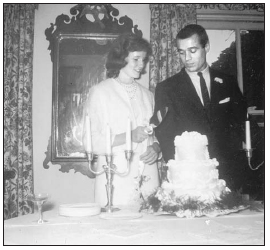
My mother’s siblings, however, missed the ceremony. Brook’s boat had suddenly sprung a leak, and they had to stop off at the country club to prevent it from sinking. Among the pictures that eventually ended up in our family album, there are none of the traditional portraits that mark the union of two families. Instead my parents’ relatives appear in the background of candid shots, as if their photos had to be taken when they weren’t looking. If the gathering has a slightly grim and perfunctory air—as if the people there have been herded together against their will—there is also a resoluteness to their appearances, for they all know the unlikelihood of this particular group’s ever being assembled again. My parents were setting off for a new world, united by their great hope in the future and their desire not to look back.
